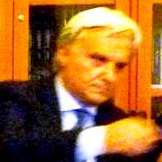Federico Tiezzi’s staging of Die Walküre returns at the Teatro di San Carlo for the third time, after previous stagings in 2005 and 2019. Once again, we are in front of a dramaturgy whose deepest conception resides in allusive (and elusive) symbols and scarcity of gestures. The second opera of Wagner's Ring cycle is staged as an intimate drama; the mythological essence on which the composer designed it is not forgotten, though only implicitly reminded. The implied message seems to be that the age of gods is over.
Anyway, as Die Walküre is that part of the Ring in which there is more passion, which turns to lust in some moments, emotional outbursts are expected. So, we see the ardent yet incestuous love of the twins Wotan had generated, the fury of Fricka for this transgression of the laws of nature, of culture, and the torments of Wotan. When Fricka claims that the two lovers must be punished, the monologue of Wotan is of dramatic intensity, which is represented and reflected by the mirrors surrounding his anguishes. Tiezzi is good at rendering the conflicts inside him, feeling guilty in the end for condemning his beloved Brünnhilde for having disobeyed his orders, and in general the contrasts between the characters with a measured and thoughtful acting. All the tragedy lies in the restrained performances of the protagonists.
The vocal cast was excellent. Christopher Maltman’s Wotan was remarkable, his voice authoritative and tormented, with a firm emission. Okka von der Damerau made for an imposing Brünnhilde with a powerful voice, resolving the high range without effort. The soprano Vida Miknevičiūtė was a crystal-voiced Sieglinde, intimately sung yet ardent at some points, gripping and compassionate likewise. As Siegmund, Jonas Kaufmann showed a beautiful clear voice, also capable of smoothness. After some less-than-perfect performances heard at the San Carlo, his voice has reacquired its power and has come out with beautiful dramatic, virile force.
Varduhi Abrahamyan was Fricka, also excellent in all respects. Her always homogeneous timbre, vocal power, passionate feelings and gestures showed expressive force without unnecessary emphasis. The suspicious, authoritarian Hunding was John Relyea, with his impressive, well-knit bass, deep and hollow in the lowest range.
The Valkyries (Nina-Maria Fischer, Miriam Clark, Margarita Gritskova, Christel Loetzsch, Regine Hangler, Julia Rutigliano, Edna Prochnik and Marie-Luise Dreßen) were not all perfectly in tune with one another, but as their ride is the most anticipated scene by operagoers, their appearance transmitted strong excitement all the same: here the director's choice was not to celebrate the fallen heroes in Valhalla but to mourn for their lost lives.
Overall the performance was of great prominence, even if Dan Ettinger’s conducting was slower than necessary and showed not much variety in contrasts, with some passages featuring exhaustingly loose tempos, adding more heaviness than was necessary. Nonetheless, his interpretation dug deeply into the mind of the characters, and he was able not to have the singers submerged by the orchestra, which in turn offered a suitable performance.




